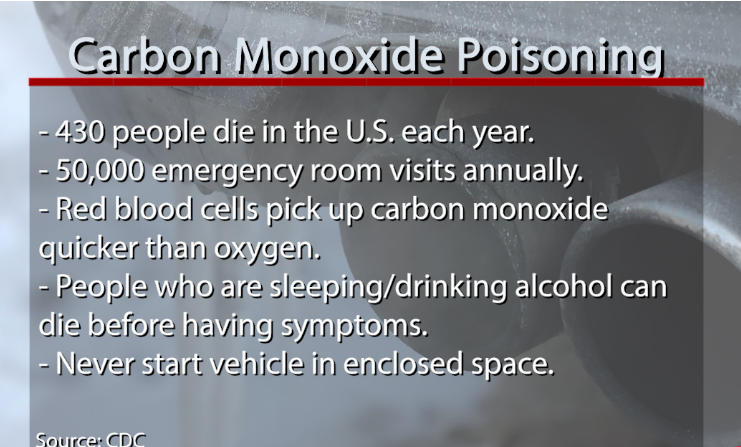GZAIR reminds drivers that it is never safe to start or leave a vehicle running in an enclosed space, such as a garage. Vehicle exhaust contains poisonous carbon monoxide gas and can cause severe injury and even death if inhaled. According to the Centers for Disease Control and Prevention (CDC), more than 400 Americans die each year from unintentional carbon monoxide poisoning not linked to fires, more than 50,000 people visit emergency rooms, and more than 4,000 others are hospitalized

Drivers are also reminded to be extremely cautious on frozen and slippery surfaces when walking to and from vehicles and when walking around their home
GZAIR recommends drivers to:
- Never start or operate a vehicle in an enclosed area, such as a garage.
- Make sure the exhaust pipe isn’t clogged with snow, ice, or mud. A blocked exhaust could cause deadly carbon monoxide gas to leak into the passenger compartment when the engine is running.
- Never leave your vehicle unattended with the engine running.
- Have a mechanic check the exhaust system of your car or truck every year. A small leak in the exhaust system can lead to a build-up of carbon monoxide inside the car.
- Keep your gas tank at least half full to avoid gas line freeze-up during winter months.
- Unplug phone chargers and USB cables for digital devices as soon as you turn off your engine.
- When driving avoid using your car’s heater longer than you need to; heaters put extra strain on your battery.
GZAIR recommends homeowners and renters to:
- Never use a gas range or oven to heat a home.
- Never run a generator, pressure washer, or any gasoline-powered engine inside a basement, garage, or other enclosed structure, even if the doors or windows are open, unless the equipment is professionally installed and vented. Keep vents and flues free of debris, especially if winds are high. Flying debris can block ventilation lines.
- Never use a charcoal grill, hibachi, lantern, or portable camping stove inside a home, tent, vehicle or camper.
- If conditions are too cold, seek shelter with friends or at a community shelter.
- If carbon monoxide poisoning is suspected, consult a health care professional right away or call 911.
During winter weather, drivers are encouraged to stay tuned to weather forecasts prior to a long-distance road trip and before driving in rural areas. Drivers should delay trips when especially bad weather is expected. Before departing, people should let others know their intended route, destination and estimated time of arrival.

Leave A Comment